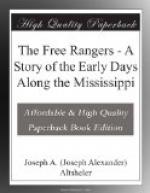“I didn’t know Tom Ross had sech a gift o’ gab,” said Shif’less Sol. “He stirs me all up, he makes me want to hev some lady buy a ship fur me an’ start me out to discoverin’ continents. Do you think, Paul, thar’s any lady who would sell her earrings an’ finger rings fur me ez that Spanish one did fur Columbus?”
“But think, Sol, what a chance you’ve got whether there is or not,” said Henry Ware. “America is discovered but not much of it is explored. There’s enough here to keep you roaming about for the next fifty or sixty years.”
“That’s so,” said the shiftless one brightening up. “What am I growlin’ about, when here’s a river, mebbe ten thousand miles long that we know next to nothin’ ‘bout, an’ buffalers an’ b’ars an’ panthers an’ deer to shoot, an’ red Injuns to fight ez long ez I live. After all, we’re shorely mighty lucky to live at the time we do, ez I’ve said before. Do you think thar’ll ever be any times hereafter as interestin’ ez ourn, Paul?”
“I can’t say,” replied Paul with a smile, “but they’re not likely to be as interesting to us.”
They went on their way, and the air became still warmer. Moreover, it grew heavy and oppressive, and the spring rains were resumed with great violence. They had worked meanwhile on their tarpaulin, enlarging and strengthening it with skins which they had allowed to dry on the boat, and they rested, sheltered and secure, as they floated along.
Although Frenchmen had gone up and down the river long before, they felt like genuine explorers. So little was known of the mighty stream that they regarded every stretch and turn with keen interest. It was not beautiful now, a vast, brown flood flowing between low and changing shores, but in its size and loneliness it had a majesty peculiarly its own.
Wild geese and wild ducks flew over the river in abundance, and they were so little used to man that often they passed near “The Galleon.” The fowling pieces proved useful again, as the five were able to sit in comfort on their boat and shoot geese and ducks for their needs. Some were of kinds that they had never seen before, but all proved to be good eating, and they were welcome.
Jim Hart also exercised his ingenuity in a very useful manner. In the prow of the boat, but under the tarpaulin, he spread a layer of mud about two inches thick. Protected from the rain, it soon dried, forming a hard, impervious, brick-like covering for the bottom of the boat, and upon this he built a small smothered fire of dry sticks, a supply of which they kept in the boat. Here Jim, with all the skill and delicacy of a gastronomic artist, would cook their wild ducks and wild geese, and, considering the limited area and resources for the exercise of his favorite occupation, he did extremely well. Nor was it any longer necessary for them to run in to the shore and worry in the dripping forest with wet wood.
“It ain’t like that stove we built the time we wuz on the ha’nted islan’,” Long Jim would say, “but it’s a heap sight better than nothin.”




